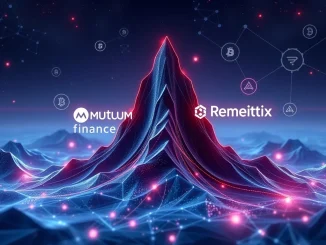
Imagine a digital asset, born just over a decade ago, now standing shoulder-to-shoulder with the world’s most established corporate giants. That’s exactly what happened recently as the Bitcoin market cap achieved a remarkable milestone, surging past Amazon’s valuation.
What Does a $2.16 Trillion Bitcoin Market Cap Mean?
Market capitalization, or market cap, is simply the total value of all coins or shares in circulation. For Bitcoin, it’s calculated by multiplying the current price by the total number of Bitcoin mined. Hitting a staggering $2.16 trillion isn’t just a number; it represents immense value creation in a relatively short period. It signifies growing acceptance and investment on a massive scale, pushing Bitcoin into a league previously reserved for only a handful of global assets and companies.
Think about it: just a few years ago, Bitcoin was considered niche, volatile, perhaps even a fad. Now, its total value exceeds that of one of the most dominant companies of the 21st century. This shift reflects a fundamental change in how investors and institutions perceive this digital asset.
Bitcoin Surpasses Amazon: A Symbolic Shift?
The news that Bitcoin surpasses Amazon in terms of market cap is highly symbolic. Amazon, a powerhouse in e-commerce, cloud computing, and logistics, represents the pinnacle of traditional corporate success in the digital age. Bitcoin, on the other hand, represents a decentralized, digital-native form of value, independent of any single company or government.
At its peak during this surge, Bitcoin’s market cap briefly touched $2.16 trillion, just enough to edge out Amazon’s $2.15 trillion valuation at the time. While market caps fluctuate constantly, this moment highlights the increasing scale and significance of the cryptocurrency space.
This comparison isn’t about which is ‘better’ as an investment or technology, but rather a powerful illustration of Bitcoin’s growth and its increasing relevance in the global financial landscape.
Becoming the World’s 5th Largest Asset
Achieving the rank of the world’s 5th largest asset places Bitcoin in an elite category. While rankings can vary slightly depending on the exact assets included (e.g., national debt, real estate), commonly cited lists of top assets often include gold, major tech companies, and sometimes government bonds.
Placing fifth, even temporarily, means Bitcoin is now valued more highly than most individual companies and many traditional asset classes. This position grants it increased visibility and credibility among mainstream investors and financial advisors.
Here’s a simplified look at the top tier (order and values are approximate and constantly changing):
- Gold
- Saudi Aramco
- Microsoft
- Apple
- Bitcoin (at its peak during this event)
- Amazon (just below Bitcoin at this moment)
This puts Bitcoin in direct conversation with assets and companies that have defined global wealth for decades.
Driving Force: Bitcoin ETF Inflows
What’s fueling this impressive surge in the crypto market cap, specifically Bitcoin’s? A major catalyst has been the unprecedented inflows into newly approved spot Bitcoin Exchange-Traded Funds (ETFs) in the United States.
These ETFs provide a regulated, accessible way for traditional investors and institutions to gain exposure to Bitcoin’s price movements without directly buying and storing the cryptocurrency themselves. This has opened the floodgates for significant capital.
A prime example is BlackRock’s iShares Bitcoin Trust (IBIT), which was reported to have attracted around $9 billion in inflows. This level of institutional adoption through ETFs is a game-changer, providing consistent buying pressure that has helped propel Bitcoin’s price and, consequently, its market cap to new heights.
Consider the impact:
- ETFs simplify investment for traditional portfolios.
- They attract large pools of institutional capital.
- Increased demand from ETFs directly impacts Bitcoin’s price.
- This validates Bitcoin as a legitimate asset class for diversified portfolios.
What Does This Mean for the Future?
Bitcoin’s ascent past Amazon and into the top 5 assets globally is a significant milestone. It underscores the growing acceptance of digital assets in the mainstream financial world. While volatility remains a characteristic of the crypto market, the structural demand introduced by ETFs suggests a potential shift in market dynamics.
For investors, this highlights the importance of understanding this evolving landscape. It’s not just about price speculation anymore; it’s about a maturing asset class attracting serious institutional interest.
Actionable Insights:
- Stay informed about ETF flows and regulatory developments.
- Understand that market cap is just one metric; volatility persists.
- Consider how digital assets might fit into a long-term investment strategy, keeping risk tolerance in mind.
- Always conduct thorough research before making investment decisions.
Conclusion: A New Era for Digital Assets?
Bitcoin reaching a $2.16 trillion market cap and briefly surpassing Amazon is more than just a headline; it’s a powerful indicator of the shifting financial world. Fueled by significant Bitcoin ETF inflows, this achievement cements Bitcoin’s position as a major global asset. While challenges remain, this milestone suggests a potential new era where digital assets play an increasingly prominent role in global finance. It’s a fascinating time to watch the continued evolution of the crypto market cap and Bitcoin’s place within it.



